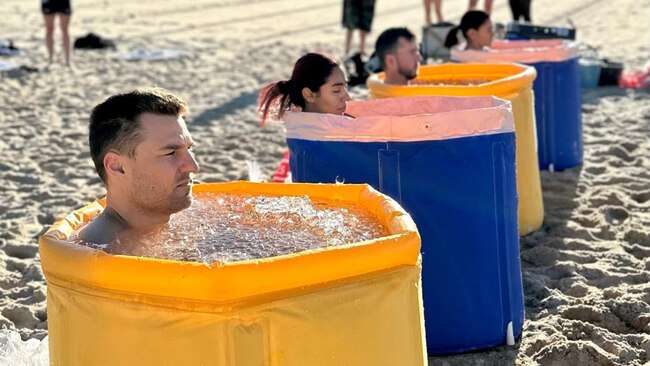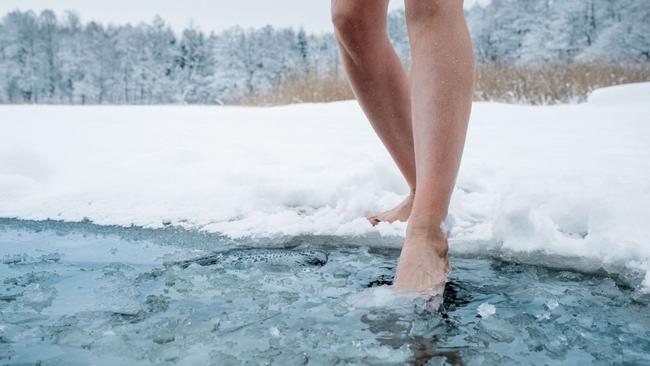Why the ice bath wellness trend could land you in hot water
Think before you plunge

Lifestyle
Don't miss out on the headlines from Lifestyle. Followed categories will be added to My News.
Ice baths are fast becoming everyone’s favourite wellness trend, often incorporated as part of a daily ritual all year long. But does the freezing immersive therapy live up to the hype, or could your early morning plunge be doing more harm than good?
It’s no secret that cold water immersion therapy has been linked to countless physical and mental health benefits. In fact, ice baths are renowned for their ability to relieve inflamed muscles post-exercise. The dedication and mental strength required to immerse your body past its natural instincts are also said to do wonders for developing a strong mindset
Inspired by the hardcore teachings of Wim Hoff, ice baths are fast becoming the preferred recovery method of athletes and amateurs alike. But while stepping outside our comfort zone is universally acknowledged as a necessity for positive change, not everyone is convinced the short-term pain of an ice bath is without risk.
With more Aussies embracing the shiver-inducing ice baths without hesitation, experts are weighing in on the effectiveness and safety of the practice – more than ever after a series of tragic deaths linked to the wellness activity.

Though the viral activity boasts a supposedly impeccable ability to promote full-body recovery, heightened resilience and endurance, and a better general state of wellness, the rising number of fatalities linked to ice baths suggests otherwise.
Last year, 39-year-old Kelly Poole’s heart stopped during a session of cold water immersion therapy in the UK, an accident the coroner assigned to the case says was likely caused by the lack of regulation.
The concern is echoed by Professor Mike Tipton of the University of Portsmouth, who after 40 years of studying the phenomenon, concludes young and healthy individuals who engage in the activity have a 1 to 3 per cent chance of cardiac arrhythmia when immersed in freezing water.
“One of the main positives that people claim is that it awakens you, sets you up for the day, makes you feel enlivened,” Tipton tells The Guardian. “And it’s unsurprising that plunging a tropical animal, which is what we are, into cold water will surprise them.”
“There is evidence of benefits, but we’re in the realms of snake oil if you start telling people that it’s a cure-all that will solve all your problems,” he adds.
"Cold water immersion can induce a high incidence of cardiac arrhythmias, with about one in three cardiac arrhythmias in young, fit and healthy individuals with head-out immersion." Shockingly, the odds of an episode increase to 80 per cent with breath-holding and face immersion.

But like any trend that takes off, the highly praised benefits of cold water immersion therapy has sparked a wave of copycats, some more suitable to the activity than others.
As part of training, properly-equipped cold immersion instructors learn to be wary of high blood pressure and other conflicting diseases, how to properly recognise signs of trouble in individuals during and after the therapy, and the safest process of guiding people to use their breath to gain control of their physical and mental reactions.
But sadly, even those well-trained in the trend are unable to predict every possibility when it comes to how people will physiologically react in the water. Poole’s own cold water therapist Kevin O'Neill followed every recommended protocol, checking if his participants had any prior medical concerns and taking them through a 15-minute breathing exercise in preparation.
Still, Poole – who had no medical complications on record – quickly complained of a headache and collapsed upon entering the ice bath.
And as Tipton points out, most wellness-amateurs plunging neck-deep into at-home or public ice baths aren’t properly educated on the danger of freezing water on the human body.
Even the infamous Wim Hof himself has had to distance his signature method from copycat endeavours that carry potential risk due to a lack of education and safety measures. "We've noticed an increase in breath work and cold-exposure coaches not affiliated with us. Many may not adhere to strict health and safety protocols, which is concerning," reads a disclaimer on his website.

Do the benefits outweigh the risks?
While there’s no shortage of early-morning beachgoers and internet experts loudly boasting the benefits of regular ice baths, Professor Tipton says these glowing reviews are more ‘anecdotal’ than scientific.
In fact, he believes many of the mental health benefits, such as an increase in alertness, and claims of increased immune function are little more than a placebo effect.
“Anecdotal evidence is still evidence and a placebo effect is still an effect”, he says on the limited evidence of an ice bath’s impact on the body’s function, “other than for the cold shock response on initial immersion which is dangerous, but also releases a lot of alternating stress-related hormones”.
“People know nothing about the peripheral vascular damage [blood circulation disorder] ice water can inflict,” he warns.
More Coverage
Originally published as Why the ice bath wellness trend could land you in hot water




